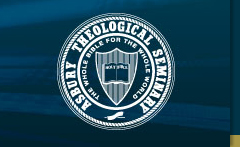-

BS 503 Introduction to Biblical Studies: Inductive Bible Study
Joseph R. Dongell
A. Required 1. Bibliography: Bauer, David R. An Annotated Guide to Biblical Resources for Ministry. Peabody, MA: Hendrickson, 2003. 1-56563-723-2 [Available new from Amazon, $15.75] 2. Ryken, Leland, James C. Wilhoit and Tremper Longman, eds. Dictionary of Biblical Imagery. Downers Grove, IL: InterVarsity Press, 1998. 0-8308-1451-5 $50.00
-

CL 615 Cross-Cultural Leadership
Christina Tellechea Accornero
· Lifting the White Veil: An Exploration of White American Culture in a Multiracial Context, by Jeff Hitchcock, Crandall Dostie & Doughlass Publishers, 2003. · Living in Color: Embracing God's Passion for Ethnic Diversity, by Randy Woodley, InterVarsity Press, 2001. · United by Faith: The Multiracial Congregation as an Answer to the Problem of Race, by Curtiss P. DeYoung, Michael O. Emerson, George Yancey, and Karen C. Kim, Oxford University Press, 2003.
-

MS 653 Cross-Cultural Leadership
Christina Tellechea Accornero
· Lifting the White Veil: An Exploration of White American Culture in a Multiracial Context, by Jeff Hitchcock, Crandall Dostie & Doughlass Publishers, 2003. · Living in Color: Embracing God's Passion for Ethnic Diversity, by Randy Woodley, InterVarsity Press, 2001. · United by Faith: The Multiracial Congregation as an Answer to the Problem of Race, by Curtiss P. DeYoung, Michael O. Emerson, George Yancey, and Karen C. Kim, Oxford University Press, 2003.
-

OT 701 Biblical Aramaic
Bill T. Arnold
Brown, Francis, S. R. Driver, and Charles A. Briggs. A Hebrew and English Lexicon of the Old Testament. Oxford: Oxford University Press, 1907. Repr., Peabody, Mass.: Hendrickson, 1979. Elliger, K., and W. Rudolph. Biblia Hebraica Stuttgartensia. Stuttgart: Deutsche Bibelgesellschaft, 1967-1977. Rosenthal, Franz. A Grammar of Biblical Aramaic. 6th ed. Wiesbaden: Harrassowitz, 1995.
-

OT 810 Exegesis of Deuteronomy
Bill T. Arnold
Alexander, Patrick H., et al. The SBL Handbook of Style for Ancient Near Eastern, Biblical, and Early Christian Studies. Peabody, Mass.: Hendrickson Publishers, 1999. Levinson, Bernard M. Deuteronomy and the Hermeneutics of Legal Innovation. New York: Oxford University Press, 1997. MacDonald, Nathan. Deuteronomy and the Meaning of "Monotheism." FAT II/1. Tübingen: Mohr Siebeck, 2003. Students will also be expected to have the following ready-to-hand (abbreviations are available in Alexander, SBL Handbook): BHS, GKC, IBHS, Joüon. In addition, BHQ is now available for Deuteronomy, and is preferable for this class: Carmel McCarthy, Biblia Hebraica Quinta: Deuteronomy (Stuttgart: Deutsche Bibelgesellschaft, 2007).
-

CO 611 Dynamics of Human Sexuality
Asbury Theological Seminary
Hyde, J. S. (2006). Understanding Human Sexuality, (9th Edition), Boston: McGraw Hill. (Chapters 1-12, and 20 required – other chapters recommended) Laaser, M. (2004). Healing the Wounds of Sexual Addiction. Grand Rapids, MI: Zondervan. Rosenau, D. (2002). A celebration of sex (Rev. and updated. ed.). Nashville: Thomas Nelson. Rosenau, D., & Wilson, M. T. (2006). Soul virgins : redefining single sexuality. Grand Rapids, Mich.: Baker Books. senau, D.E., Sytsma, M., and Taylor, D.L. (2001). Sexuality and Sexual Counseling: Learning and Practicing the DEC-R Model. In T. Clinton, and G. Ohlschlager (Eds.) Competent Christian Counseling, Colorado Springs: Waterbrook. hnarch, D. M. (1995). A Family Systems Approach to Sex Therapy and Intimacy. In R. Mikesell, D. Lusterman, and S. H. McDaniel (Eds.), Integrating Family Therapy: Handbook of Family Psychology and Systems Theory. Washington, D.C.: American Psychological Association. sma, M., Taylor, D. (2003). Current thinking in how to help couples and individuals struggling with low sexual desire. Marriage and Family: A Christian Journal, 5(3). senau, D., Childerston, J., & Childerston, C. (2004). A celebration of sex after 50. Nashville, Tenn.: Thomas Nelson Publishers. (Chapters 1 and 20 only.) nkmann, S. (2004). The Kinsey Corruption: an expose on the most influential "scientist" of our time. West Chester, PA: Ascension Press. (See webpage for required pages.)
-

CL 611 Foundations of Leadership
Charlotte Bates
Clinton, J. Robert. (1988). The Making of a Leader. Colorado Springs: NavPress. 272 pages Hersey, Paul, Blanchard, Ken & Johnson, Dewey E. (2008). Management of Organizational Behavior. (9th ed.). Englewood Cliffs, NJ: Prentice Hall. 325 pages Wren, Thomas J. (1995). The Leader’s Companion: Insights on Leadership Through the Ages. New York: The Free Press. 554 pages
-

BS 502 Introduction to Biblical Studies
David R. Bauer
1. The Bible (NRSV) 2. Biblical Resources for Ministry, Bauer 3. Bible Study That Works, Thompson 4. Introduction to the New Testament: Its Literature and Theology, Achtemeier, Green, Thompson 5. The World That Shaped the New Testament, Roetzel
-

NT 637 Pauline Epistles
David R. Bauer
1. Revised Standard Version of the Bible 2. The Greek New Testament (or Interlinear Greek-English New Testament) 3. An Annotated Guide to Biblical Resources for Ministry, by David R. Bauer 4. It's Still Greek to Me, by David A. Black 5. A Dictionary of Paul and His Letters, edited by Gerald F. Hawthorne, Ralph P. Martin, and Daniel G. Reid.
-

NT 646 Hebrews
David R. Bauer
Revised Standard Version of the Bible, Greek New Testament, or Interlinear Greek New Testament. It's Still Greek to Me, by David A. Black An Annotated Guide to Biblical Resources for Ministry, by David R. Bauer
Printing is not supported at the primary Gallery Thumbnail page. Please first navigate to a specific Image before printing.















